| Buchhandlung Heesen | Versandbuchhandlung für Evangelische Theologie |
Impressum | |
| Freudenstadt / Loßburg | Datenschutzhinweise | ||
| Tel. 07446 952 418 1 | Buchhandlung.Heesen@t-online.de | ||
| Da unsere Angebote manuell erstellt werden und während des Seitenaufrufes keine Verbindung zu einer Buchdatenbank aufgebaut wird prüfen wir die Verkaufspreise bei Rechnungsstellung auf Richtigkeit und berechnen den gesetzlich festgelegten Buchpreis. Falls sich dadurch eine Preiserhöhung ergibt werden wir Sie vor Versand informieren, Sie können dann diesem Preis zustimmen oder vom Kauf zurücktreten. Hinweise zum Datenschutz und Cookies | |||
|
Lublin Theological Studies, Vandenhoeck & Ruprecht |
||
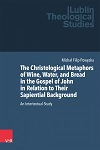 |
Michal Filip Poweska The Christological Metaphors of Wine, Water, and Bread in the Gospel of John in Relation to Their Sapiential Background Vandenhoeck & Ruprecht, 2024, 432 Seiten, Gebunden, 978-3-525-50098-9 120,00 EUR |
Lublin Theological
Studies Volume 13 An Intertextual Study When focusing on the sapiential traits in text of the Fourth Gospel, it should be noted that in its images of wine, water, and bread, connected by the common theme of eating and drinking, one can see Jesus the Giver, who, like the Old Testament personified wisdom, bestows his gifts on man. Although single references to the Old Testament sapiential texts have been suggested for the Johannine images of wine, water, bread, light, and the vine, no detailed study of these images, as well as their juxtapositions even in the aspect of eating and drinking, has been published so far. The selected topic seems to be important for showing a comprehensive approach to the Johannine banquet motif in its sapiential aspect, broken down into particular Johannine images, which are the events related to wine, water, and bread. It is ultimately significant to present Jesus’ full identity through these three metaphors, referring to the personified and preexisting wisdom as described in the Old Testament sapiential literature. [Joh 13,21-26] |
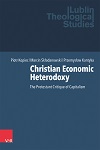 |
Piotr Kopiec Christian Economic Heterodoxy Vandenhoeck & Ruprecht, 2024, 216 Seiten, Gebunden, 978-3-525-50089-7 99,00 EUR |
Lublin Theological
Studies Volume 12 The Protestant Critique of Capitalism This volume could be written differently. It could present the Protestant theological view on the economy from Luther, Zwingli and Calvin until contemporary prominent theologians. Or it could be a description of the teaching of one of the Protestant Churches or denomination. Or it could be an investigation of the traces of Protestant theology in the contemporary prevailing economic order. All such presentations could be hugely interesting and accurate – and they would be reasonable in light of the most critical questions of today’s world. However, the authors would propose a different approach that is not disjunctive, contrasting or opposing to the above-mentioned and that instead wants to reveal new trends and processes occurring in the Protestant world and bringing a new, more critical view on capitalism and its offspring, such as consumptionism. |
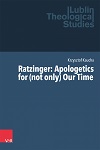 |
Krzysztof Kaucha Ratzinger: Apologetics for (not only) Our Time Vandenhoeck, 2024, 352 Seiten, Gebunden, 978-3-525-50075-0 99,00 EUR |
Lublin Theological
Studies Volume 11 Defending Christianity in our time became unpopular, “private”, shy and... poor. Catholic fundamental theology – officially responsible for defending faith on behalf of the Catholic Church – is aware of being in crisis: crisis of identity and content, and... popularity. It needs a new overall structure: a new point of departure and a new “spirit”. It was offered by Joseph Ratzinger, Krzysztof Kaucha declares. Almost everything that has been recently used to undermine the Christian faith and Christianity is used by Ratzinger to… defend Christianity. Kaucha offers over a dozen arguments for Christianity based on Ratzinger’s writings (and his original thinking): the Christian axiom as an argument for Christianity, Jesus Christ as the proof of the existence of God, Divine Revelation as an unending proof of God’s existence, the alternative argument, the argument from definitive novelty, the argument from the absence of someone greater than Jesus, argument from truth, the anthropological argument, the argument from forgiveness, the argument “from reason”, the argument from faith, Ratzinger’s wager (in analogy to the famous Pascal’s wager), the argument from the whole truth (many times very painful for Christians) about Christianity, the argument from the whole truth (many times very shameful for Catholics) about the Church, comparative argument no. 1 (Christianity versus other Religions), comparative argument no. 2 (Christianity versus the ever more secularized world). |
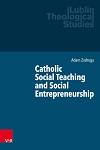 |
Adam Zadroga Catholic Social Teaching and Social Entrepreneurship Vandenhoeck & Ruprecht, 2024, 148 Seiten, Gebunden, 978-3-525-50055-2 100,00 EUR |
Lublin Theological
Studies Volume 10 One of the significant factors in the responsible implementation of social entrepreneurship is the appropriate shape of the norms and values that determine it. With this in mind, this book draws on Catholic social teaching (CST) to make an original contribution to understanding and describing the axionormative determinants of social entrepreneurship. In the course of analysis and meta-scientific reflection, it was established that the axionormative determinants of social entrepreneurship revolve around three areas: (1) the axiology of (the idea of) social entrepreneurship; (2) the moral principles of social enterprise management; (3) the professional ethics of social entrepreneurs. This approach to research has allowed the original formulation of: (1) the constitutive values of the idea of social entrepreneurship; (2) the concept of the moral dimension of social enterprise management; (3) the concept of professional ethics of social entrepreneurs. |
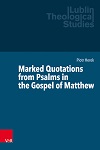 |
Marcin Herok Marked Quotations from Psalms in the Gospel of Matthew Vandenhoeck & Ruprecht, 2023, 319 Seiten, Gebunden, 978-3-525-50052-1 130,00 EUR |
Lublin Theological
Studies Volume 9 There are five marked quotations from Psalms in the Gospel of Matthew. These are: (1) Ps 91:1–12 in Matt 4:6; (2) Ps 78:2 in Matt 13:35; (3) Ps 8:3 in Matt 21:16; (4) Ps 118:22–23 in Matt 21:42; and (5) Ps 110:1 in Matt 22:44. Piotr Herok argues that the investigated texts are related to each other not only by the presence of the introductory formulas, making clear that a given citation comes from Scripture, but also through mutual thematic convergence, concerning in various degrees king David, the temple, and the theme of Jesus’ identity. Thanks to the new literary context, in which the quotations are embedded, Matthew reinterprets them significantly while giving them a new dimension clearly distinguishing them from the rest of the psalm quotations found in his work. This aims at presenting Jesus as not only the Son of David, but first of all the Son of God. |
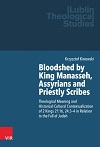 |
Krzysztof Mielcarek Bloodshed by King Manasseh, Assyrians and Priestly Scribes Vandenhoeck & Ruprecht, 2024, 374 Seiten, Gebunden, 978-3-525-50043-9 130,00 EUR |
Lublin Theological
Studies Volume 8 Theological Meaning and Historical-Cultural Contextualization of 2 Kings 21:16, 24:3-4 in Relation to the Fall of Judah King Manasseh of Judah is one of the most intriguing characters in the Bible. 2 Kings presents him as the wickedest of monarchs. In 2Kgs 24:3–4, he is accused of having provoked God to destroy Judah on account of the innocent blood he had shed in Jerusalem (cf. 2Kgs 21:16). In his study Krzysztof Kinowski investigates this accusation, viewing it against the biblical and ancient Near East backgrounds, and casts a new light upon Manasseh’s role in the fall of Jerusalem. The mention of bloodshed in this affair appears to be the outcome of a process of scapegoating of Manasseh, ongoing in 2 Kings and reflecting both the legal and the cultic paradigms governing the biblical historiography. The link between Manasseh’s bloodshed and the destruction of Judah on account of the cultic land’s blood-defilement points towards a group of priestly scribes involved in the production of the 2Kgs 21 and 24 narratives. This assumption lies behind the scholarly discussion about the Priestly-like strata and priestly touches in the Books of Kings. |
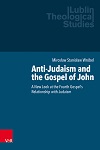 |
Miroslaw Stanislaw Wröbel Anti-Judaism and the Gospel of John Vandenhoeck & Ruprecht, 2023, 297 Seiten, Gebunden, 978-3-525-50053-8 130,00 EUR |
Lublin Theological
Studies Volume 7 A New Look at the Fourth Gospel’s Relationship with Judaism In the light of the research undertaken in this book the author concludes that the so called "anti-Jewish" texts in Johannine Gospel are not directed against the Jews being an ethnic or religious community. The object of the polemic and attacks is not the entire Jewish nation across the span of all the ages but a group of the Jewish leaders or opponents to Jesus in the First Century AD. Looking through the prism of the aposynagogal polemics, one can notice that the state of tension between the Johannine community and the rabbinic Judaism is inter-Jewish, not anti-Jewish, in character. The source of the polemical language of the Fourth Gospel is the Christological discussion in the historical and sociological context (the Messianic confession, the excommunication from the Synagogue, the presence of Samaritans in the Johannine community, the struggle for the preservation of the identity). |
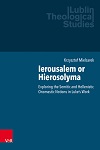 |
Krzysztof Mielcarek Ierousalem or Hierosolyma Vandenhoeck & Ruprecht, 2023, 288 Seiten, Gebunden, 978-3-525-50042-2 120,00 EUR |
Lublin Theological
Studies Volume 6 Exploring the Semitic and Hellenistic Onomastic Notions in Luke’s Work There is no doubt that Jerusalem in the Bible is a city of great historical and theological significance. However, many modern readers are unaware that authors writing in Greek used its two names, Ierousalem and Heriosolyma. Among the few who used both names simultaneously is Luke the Evangelist. Commentators of this onomastic phenomenon have tried to explain this fact in various ways, referring to Luke's literary and theological choices or denying its meaning altogether. Krzysztof Mielcarek's monograph proposes a new view and explanation of this phenomenon in a theological-historical key. In his opinion, Luke's choices may be underpinned by his deep immersion in the world and terminological richness of the Septuagint, as well as important historical events that influenced the perception of the Holy City by the Hellenistic Jewish community and later also by the early Christians. |
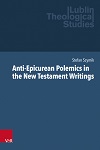 |
Stefan Szymik Anti-Epicurean Polemics in the New Testament Writings Vandenhoeck & Ruprecht, 2023, 338 Seiten, Gebunden, 978-3-525-50022-4 120,00 EUR |
Lublin Theological
Studies Volume 5 Stefan Szymik analyses New Testament texts in terms of polemic and anti-Epicurean rhetoric. To what extent and how did Epicurus and his philosophical thought influence the first Christian Churches? How did Christians react to Epicureanism? Although the New Testament only includes one account of an encounter between the Apostle Paul and the Epicureans (Acts 17:18), the probability of their contacts was high, given the popularity of Epicureanism in the Roman Empire in the first century CE. As a vital component of Hellenistic-Roman culture, Epicureanism should be taken into account in research on the New Testament, becoming a point of reference and part of the content of comparative analyses. |
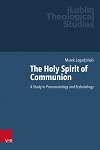 |
Marek Jagodzinski The Holy Spirit of Communion Vandenhoeck & Ruprecht, 2023, 350 Seiten, Gebunden, 978-3-525-50021-7 130,00 EUR |
Lublin Theological
Studies Volume 4 A Study in Pneumatology and Ecclesiology Communion is a dynamic reality – love, unity of life, mutual penetration, the closest union. The Holy Spirit is the Communion within the Trinity and forms the communion between God, man and the world, between people, in the Church and within whole reality of this world. Showing pneumatology as a dimension of the entire dogmatic theology determines the originality of this monograph. Typically, theologians focused their works on pneumatology itself. Marek Jagodzinski’s monograph is especially up to date since the pentecostal awakening in Christianity carries certain dangers. They take the forms of over-exposing the Holy Spirit at the expense of the Son of God, overly simplified ecumenism, emphasising charisms over the institution and putting personal experience over the community faith of the Church. The study is not only a presentation of ideas but brings new and inspiring elements to the scientific discussion. It is an original and creative contribution to the theoretical achievements of theology as a discipline of science. The dissertation brings a new name for the Third Divine Person – Communion in the Holy Trinity. Communion reflects the mission of the Holy Spirit which embraces the Church and the sacraments, voices a golden mean between forgetting about the Holy Spirit and the Joachimism of proclaiming the era of the Holy Spirit. The monograph justifies the simultaneous existence of Christology and pneumatology, brings a new perspective on Filioque and is of significance for ecumenism. |
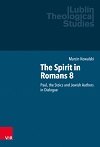 |
Marcin Kowalski The Spirit in Romans 8 Vandenhoeck & Ruprecht, 2023, 469 Seiten, Gebunden, 978-3-525-50020-0 130,00 EUR |
Lublin Theological
Studies Volume 3 Paul, the Stoics, and Jewish Authors in Dialogue Kowalski addresses the Pauline understanding of S/spirit in Romans 8, as compared to the Stoic idea of pneuma. The author first analyzes the Stoic views on pneuma perceived in a variety of life-giving, cognitive-ethical, unifying, reproductive and inspiring functions. The aforementioned features are taken as a starting point for the comparison with Paul to which, however, the third element is added, the Jewish texts of the Second Temple period. These include the Old Testament but also The Book of Enoch, The Book of Jubilees, Qumran, The Testaments of the Twelve Patriarchs, The Psalms of Solomon, Philo of Alexandria, Flavius Josephus, LAB, Joseph and Aseneth, 4 Book of Ezra and 2 Book of Baruch. Such a rich comparative material contributes to the novelty of the book and enables the reader to discover both the similarities and differences between Paul, Greco-Roman and Jewish authors. The study analyzes Romans 8 in its rhetorical context and brings to light the novelty of the Pauline view of the Spirit. The apostle portrays it in its primary cognitive-ethical and communitarian function of making the believers similar to Christ and inculcating in them the Lord’s mindset and attitudes. Paul presents the Spirit as dwelling within a person, similarly to God inhabiting the Jerusalem temple, and as the mediator of the resurrected life. In the original Pauline take the Spirit enables a close union between God and human beings in which the latter keep their freedom and distinctive personal traits. |
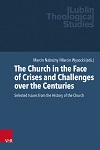 |
Marcin Nabozny The Church in the Face of Crises and Challenges over the Centuries Vandenhoeck & Ruprecht, 2023, 192 Seiten, Gebunden, 978-3-525-57358-7 110,00 EUR |
Lublin Theological
Studies Volume 2 Selected Issues from the History of the Church Challenges, crises and difficult experiences are an integral part of our lives and an inherent element of every human being’s existence, in addition to being ingrained in the functioning of organisations, institutions and nations. On many occasions humankind has failed to confront them, resulting in the real dramas that we witness on the pages of history. Fortunately, challenges, crises and difficult situations have often been lessons, from which appropriate conclusions have been drawn, thanks to which it was possible to create a better future. In the history of the Church from its very beginning, challenges have been an integral part of working towards a better tomorrow, a better version of oneself and the reality around us and the Church herself. Paradoxically, what was intended to weaken or even destroy the faith became an impulse for its spread. Crisis became the cause of consolidation and development. And so, over the centuries, the Church has faced crises caused by schisms, divisions, unsuitable people in ecclesiastical offices, as well as challenges posed by the surrounding world, political systems and conflicts of human origin. Owing to this publication, the reader will be able to learn about various types of crises and challenges in order to draw conclusions from them, to appreciate the history of the Church through a better knowledge thereof, and all this in order to create a better future. The subject of the book concerns crises and challenges during various periods in the history of the Church up until modern times, including the crisis caused by the Second World War or communism in Central and Eastern Europe. |
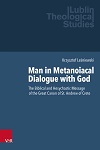 |
Krzysztof Lesniewski Man in Metanoiacal Dialogue with God Vandenhoeck & Ruprecht, 2022, 318 Seiten, Gebunden, 978-3-525-57349-5 130,00 EUR |
Lublin Theological
Studies Volume 1 The Biblical and Hesychastic Message of the Great Canon of St. Andrew of Crete This work is a theological analysis and interpretation of the Great Canon of St Andrew of Crete. The hermeneutic method used in the monograph consists in a comprehensive examination of key Greek concepts and phrases occurring in the analysed hymn in various contexts in which they occur, and on this basis creating a theological-existential synthesis. This method is based on the search for the spiritual and existential meaning of the most important terms and thus refers to the essential assumptions of patristic allegorical exegesis. The hermeneutic analysis of the content of the Great Canon in conjunction with the contextual analysis of the vocabulary used in it was considered the most appropriate, since it is the work of St Andrew of Crete can be compared to a poetic carpet woven from phrases from the Old and New Testament, which are combined with existential confessions and spiritual indications, expressed in Eastern Orthodox hesychastic terms. Reading sample with table of contents |